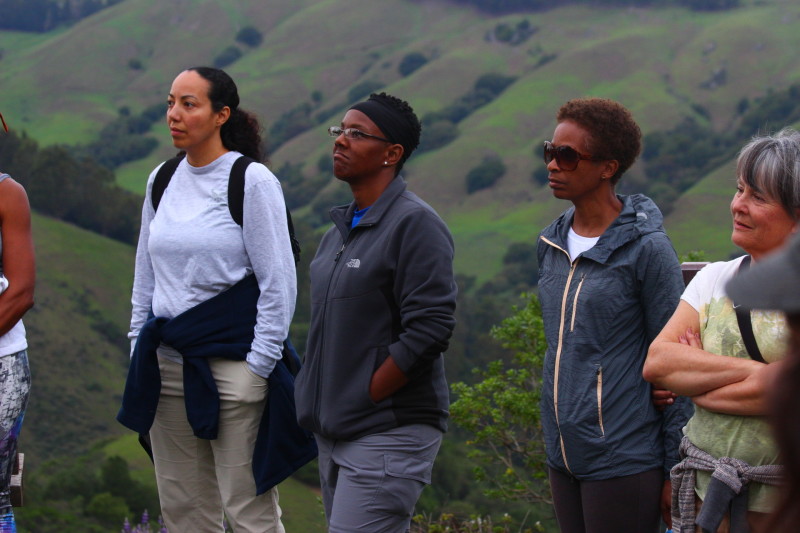On a recent Friday evening, 30 people, most of them African- American, headed to the Oakland Hills for a hike.
Trip leader Zoe Polk tells them what to expect.
“If this is your first time with Outdoor Afro, a couple of things to know about us,” she says. “We are not a competitive hiking group. Our purpose is to have community in nature and share with each other. So we’re not going to be leaving anyone behind today!”
The group starts uphill through the woods, chatting and laughing along the way. The trail soon opens up into rolling grassy hills. There’s Mount Diablo to the east and the sun setting over the Golden Gate Bridge to the west. Polk stops the group by a lupine bush, its purple flowers in bloom. She asks if anyone has read Alice Walker’s "The Color Purple."
“Is there a famous line in that book that talks about nature?” she asks.
“It’s like the color purple,” shouts one participant, paraphrasing the famous quote. “You just don’t walk past it and not notice it!” Everyone cheers in approval.
"I think it pissed God off if you walked by the color purple in a field and didn't notice it," Polk paraphrases from the book. “We’re going to pass by the color purple. And I invite you to notice it.”
Harriet Tubman, Outdoorswoman
African-Americans have a long history of connecting to nature. Mapp tells her group to think about someone like Harriet Tubman. “She was a wilderness leader,” she says. “She’s someone who led people in the cover of night through the wild. Think about all the skill sets you have to have in order to do that.”
On this hike, Outdoor Afro is partnering with GirlTrek, a black women’s walking group, to honor Tubman, the leader of the Underground Railroad.
Zoe Polk stops the group at a view along the trail. She asks everyone to think of one word that represents Tubman. They go around in a circle and share: “Inspiration. Liberation. Courage…”
Polk adds a few words of her own that we don’t normally associate with Tubman: hiker, botanist, astronomer. She reminds everyone that Tubman collected wild plants to treat the underground passengers' illnesses and she used the stars to navigate her way to freedom. “I actually love it when I remember to think of Harriet Tubman when I’m looking up in the sky,” Polk says.
Hiking to Heal
Outdoor Afro has always turned to nature as a tool to connect African-Americans with history and community. So when the nation was shaken by the violent events in Ferguson and Staten Island, Rue Mapp again turned to nature.
“It was this moment where I wanted to do something, and I knew that going to the streets was not something that felt right for me,” Mapp says.
So she organized healing hikes here in the Bay Area and called on Outdoor Afro groups across the country to do the same. The hikes have given people a chance to come together, talk and grieve. “I wanted to get away from people with other agendas and just create a platform where people could share and be heard,” says Mapp.
For Zoe Polk, being out in nature is always healing. Getting out on a hike “just allows you to put some breath into your life and just be honored and inspired by the beauty in the world and be able to hold that as well as the ugliness in the world that we also have to endure.”
Polk leads the group back to the parking lot just as it's getting dark. People say their goodbyes and drive off, taking a little bit of this peace and beauty with them.
